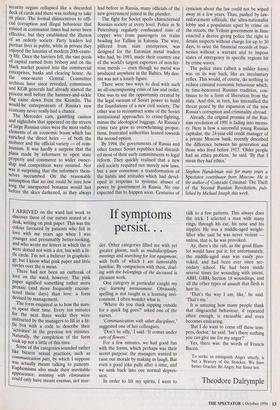If symptoms
persist.. .
I ARRIVED on the ward last week to discover three of our nurses seated at a desk, writing on pink paper. This was the colour favoured by patients who fell in love with me years ago when I was younger and presumably better-looking, and who wrote me letters in which the is were dotted not with a dot, but with a lit- tle circle. I'm not a believer in grapholo- gy, but I know what pink paper and little circles over the is mean.
There had not been an outbreak of love on the ward, however. The pink paper signified something rather more prosaic (and more frequently encoun- tered these days) than love: a form devised by management. The form enquired as to how the nurs- es spent their time. Every ten minutes for the next three weeks they were instructed by the managers to fill in a lit- tle box with a code to describe their `activities' in the previous ten minutes. Naturally, the completion of the form took up not a little of this time.
Some of the categories sounded rather like bizarre sexual practices, such as communication pats, by which I suppose Was actually meant talking to patients. Euphemisms also made their inevitable appearance: assisting with elimination could only have meant enemas, not mur- der. Other categories filled me with yet greater gloom, such as multidisciplinary meetings and searching for lost equipment, with both of which I am lamentably familiar. By comparison with these, deal- ing with the belongings of the deceased is pleasant work.
One category in particular caught my eye: learning invironment. Obviously, spelling is not taught in a learning invi- ronment. I often wonder what is.
`Where do you think nipping outside for a quick fag goes?' asked one of the nurses.
`Communication with other disciplines,' suggested one of her colleagues.
`Don't be silly,' I said. 'It comes under care of flowers.'
For a few minutes, we had good fun with the forms, which perhaps was their secret purpose: the managers wanted to raise our morale by making us laugh. But even a good joke palls after a time, and we sank back into our normal depres- sion.
In order to lift my spirits, I went to talk to a few patients. This always does the trick. I selected a man with many rings, through his ear, his nose and his nipples. He was a middle-aged weight- lifter who said he was never violent unless, that is, he was provoked.
Ay, there's the rub, as the good Ham- let would have put it: for unfortunately, the middle-aged man was easily pro- voked, and had been ever since sec- ondary school. He had been inside several times for wounding with intent, ABH, GBH, Section 18 woundings, and all the other types of assault that flesh is heir to.
`That's the way I am, like,' he said. `That's me.'
It is amazing how many people think that disgraceful behaviour, if repeated often enough, is excusable and even becomes endearing.
`But I do want to come off these tem- pers, doctor,' he said. 'Isn't there nothing you can give me for my anger?'
Yes, there was: the words of Francis Bacon.
To seeke to extinguish Anger utterly, is but a Bravery of the Stoickes. We have better Oracles: Be Angry, but Sinne not.
Theodore Dalrymple


























































 Previous page
Previous page